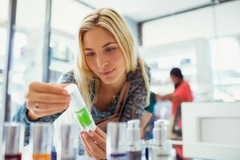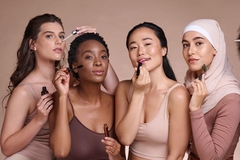Perfume engineering and art: Machine learning replaces trial-and-error fragrance creation

15 Apr 2024 --- Recent research presents a machine learning approach that enables more targeted and “efficient” fragrance development by using graph and generative neural networks to create new molecules that match desired fragrance profiles.
The study authors claim their findings bridge the gap between molecular structures and human olfactory perception, ultimately pointing to an AI future that merges with old heritage traditions of perfume creation.
The paper “Molecule Generation and Optimization for Efficient Fragrance Creation” spotlights an innovation based on a hybrid model that can also “quantify and predict odor intensity.”
“The method presented in this work is intended to be used as a tool in the manufacturing of new perfumes,” suggest the researchers.

Efficient perfume creation
According to the researchers, a key functionality of the program is its ability to choose the best fragrance molecules based on factors like scent notes and vapor pressure.
The traditionally “very labor intensive and time-consuming” trial-and-error method used in perfume creation is streamlined by this approach. Moreover, it minimizes differences between new and target scents by formulating a “mathematical optimization” problem.
 The model refines the ideal solvent and molecule combinations that are needed for producing fragrances.While hailing scientific progress, the study also recognizes the significance of fragrance heritage, highlighting the fragrances’ links with identity, culture and the natural world. Beyond business concerns, the authors maintain that the capacity to reproduce and invent scents can resonate with culture and preservation.
The model refines the ideal solvent and molecule combinations that are needed for producing fragrances.While hailing scientific progress, the study also recognizes the significance of fragrance heritage, highlighting the fragrances’ links with identity, culture and the natural world. Beyond business concerns, the authors maintain that the capacity to reproduce and invent scents can resonate with culture and preservation.
Just the beginning
From a commercial perspective, the new model can enable perfumers to explore more molecules efficiently with a slash in costs, note the authors.
“Overall, this work proposes a framework based on AI and phenomenological knowledge to reproduce olfactory experience given a target fragrance. The work then finds molecular substitutes and proposes a new formulation,” write the researchers.
In the study, the researchers tried to replicate two fragrances with the AI, finding the first one to vary slightly with a “significant difference observed in the intensity relationship between coumarin and sharp notes.”
In contrast, the second fragrance showed “more consistent results.”
Even though the present research represents a major turning point, there is still room for improvement, say the authors. More training datasets and a wider range of produced molecules will allow for closer alignment of the model with the original fragrance profiles.
Accelerating the commercial use of AI in fragrance craft, Eurofragance and Alphanosos are leveraging machine learning to eliminate malodor in personal and home care. Personalized beauty company Proven is also making use of smart systems to propel its portfolio brand Noteworthy, marketed as a “first-of-its-kind” personalized fragrance company.
By Venya Patel













